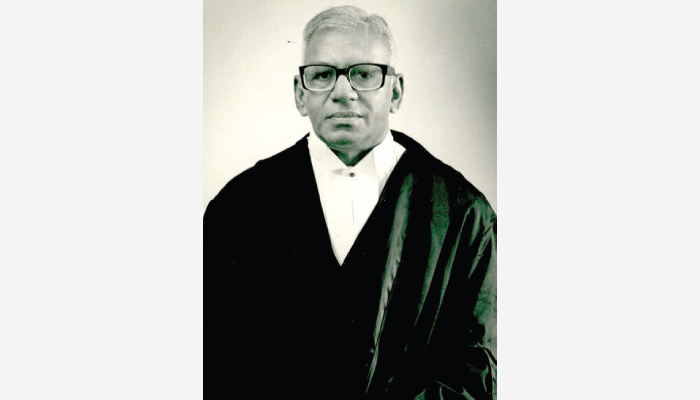
or

Justice V. R. Krishna Iyer referred to as a conscience keeper of justice in India,was a visionary and a path-breaking judge, who reformed the Indian criminal justice system with bold changes to jails & police stations, and forged new tools to dispense social justice & justice in the public interest, which stood not just the test of time, but had a profound impact on the decades which followed. He pioneered the legal-aid movement in the country. Before that, he had pioneered land reforms law as a state minister & independent politician, which became a model for the rest of the country. He stood up for the poor and the underprivileged and was jailed for this once, as an activist lawyer. He zealously guarded human-rights regardless of finding himself isolated. He was a crusader for social action & the environment, and a champion of civil liberties, throughout life.
Born in 1915 at Palakkad, in the Malabar region of the then Madras State, to a lawyer father. He inherited from his father the qualities of taking an avid interest in the community around and using the law for the benefit of those more in need.He studied law from Madras, and started practice in his father’s chamber in 1938 at Thalassery, Malabar.In 1948, when he protested the evil of torture by police for interrogation, he was imprisoned for a month on a fabricated charge of giving legal assistance to communists.
He was elected to the Madras Legislative Assembly in 1952, from Thalassery as a non-party, independent candidate.He became minister of law, justice, home, irrigation, power, prisons, social welfare and inland navigation in the first communist government in Kerala headed by E. M. S. Namboodiripad that came to power in 1957. He initiated legal aid to the poor, jail reforms incorporating the rights of prisoners, and set up more courts and rescue homes for women and children.He got several labour and land reform laws passed. He resolved an inter-state water dispute between the newly formed neighboring states, Kerala and Tamil Nadu. When this government was dismissed by the center, he resumed legal practice in August 1959. He lost the 1965 assembly election, which he again contested as an independent candidate.
He was appointed a judge of the Kerala High Court in 1968. He was a member of the Law Commission from 1971 to 1973 where he drafted a comprehensive report, which would lead to the legal-aid movement in the country. He was elevated as judge of the Supreme Court of India in 1973.
In June 1975, the Allahabad High Court had unseated Prime Minister Indira Gandhi from the Parliament and barred her from it for another six years. Rebuffing favour-seekers, he heard a challenge to this order in the Supreme Court. He was both blamed for granting a conditional stay and praised for refusing an unconditional stay.Interpreting this as losing the popular mandate to rule, the Opposition called for her resignation. The next day she declared a state of Emergency in the country.
“The law of all laws is that the ‘rule of law’ must keep pace with the ‘rule of life’.”
By climbing down from its high pedestal, shedding its static and sterile inertia, to ascertain ground realities for meeting the needs and aspirations of the people in an ever-changing society.
He retired as a judge on 14 November 1980 but, continued to advocate the cause of justice, on every forum and through his writings, participating in street protests, and his house would always remain open, bustling with all who sought his help or advice. He stood for the nation’s President in 1987, as the Opposition’s candidate against R. Venkataraman, the ruling Congress’s nominee who won. In 2002, he inquired into the Gujarat riots as part of a citizens’ panel, with retired Justice P. B. Sawant among others. He also headed the Kerala Law Reform Commission in 2009. He had been active, almost till a few weeks before his death, when ill-health and advancing age took their toll on him.
A sports enthusiast and a prolific author, he has to his credit 70–100 books, mostly on law, and four travelogues. He has also authored a book in Tamil, “Neethimandramum Samanvya Manithanum”. “Leaves from My Personal Life” is his autobiography.
He died on 4 December 2014 and was cremated with state honours. His wife, who would listen to him talk about his work, when on occasion he would change his mind after she gave her opinion on it, had predeceased him. Judges in India and around the world continue to cite his judgments in their decisions in court.
The LW Bureau is a seasoned mix of legal correspondents, authors and analysts who bring together a very well researched set of articles for your mighty readership. These articles are not necessarily the views of the Bureau itself but prove to be thought provoking and lead to discussions amongst all of us. Have an interesting read through.

Lex Witness Bureau

Lex Witness Bureau

For over 10 years, since its inception in 2009 as a monthly, Lex Witness has become India’s most credible platform for the legal luminaries to opine, comment and share their views. more...
Connect Us:


The Grand Masters - A Corporate Counsel Legal Best Practices Summit Series
www.grandmasters.in | 8 Years & Counting
The Real Estate & Construction Legal Summit
www.rcls.in | 8 Years & Counting
The Information Technology Legal Summit
www.itlegalsummit.com | 8 Years & Counting
The Banking & Finance Legal Summit
www.bfls.in | 8 Years & Counting
The Media, Advertising and Entertainment Legal Summit
www.maels.in | 8 Years & Counting
The Pharma Legal & Compliance Summit
www.plcs.co.in | 8 Years & Counting
We at Lex Witness strategically assist firms in reaching out to the relevant audience sets through various knowledge sharing initiatives. Here are some more info decks for you to know us better.
Copyright © 2020 Lex Witness - India's 1st Magazine on Legal & Corporate Affairs Rights of Admission Reserved